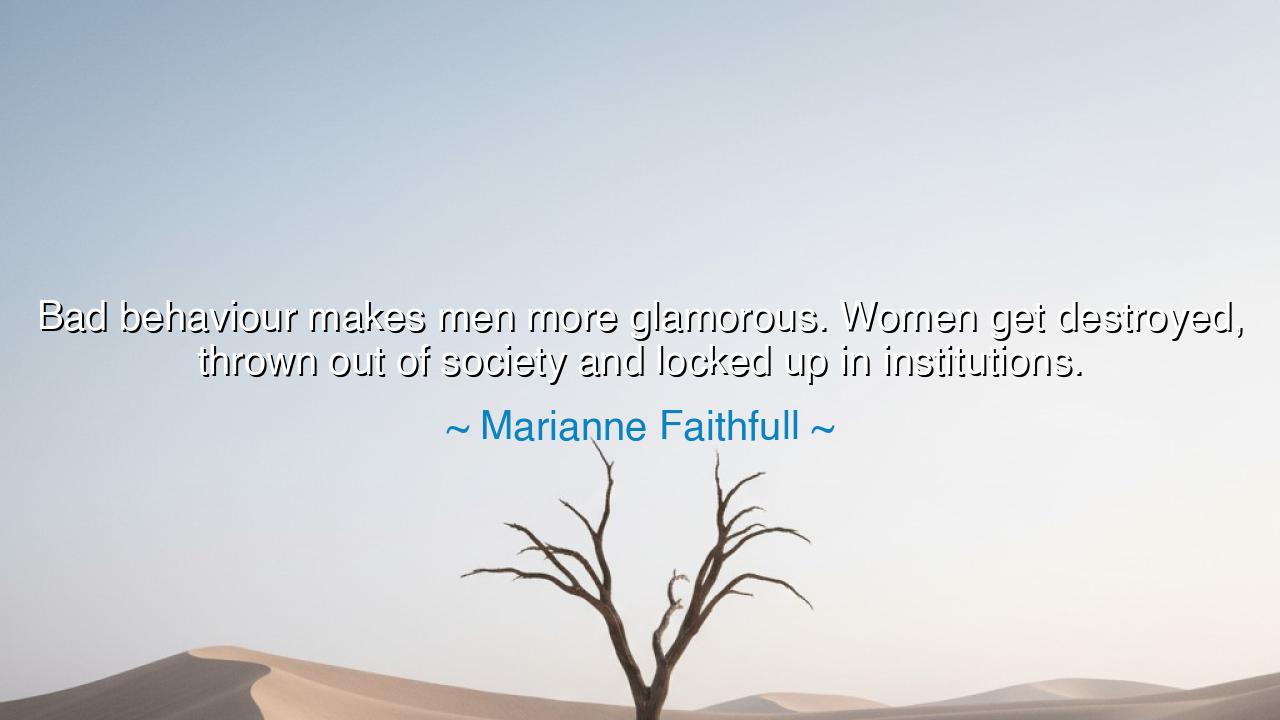
Bad behaviour makes men more glamorous. Women get destroyed
Bad behaviour makes men more glamorous. Women get destroyed, thrown out of society and locked up in institutions.






"Bad behaviour makes men more glamorous. Women get destroyed, thrown out of society and locked up in institutions." These sharp words, spoken by Marianne Faithfull, reflect a painful truth about the double standards that have long plagued society. They cut to the heart of how society views men and women—especially when it comes to the transgressions of behavior. The quote is not simply a critique of morality but a statement on how gender shapes the consequences of one's actions. The bad behavior of men is often romanticized or even glamorized, while the same behavior in women is met with punishment, rejection, and ostracization. This unequal treatment speaks to the deeper injustices that exist in how men and women are viewed and judged by society.
In the ancient world, these double standards were apparent. The Greeks, who valued the pursuit of excellence and virtue, often praised men for their courage, independence, and boldness, even when those traits led them to recklessness or immorality. Consider Alexander the Great, a man of great vision, who conquered vast lands and was celebrated as a hero. Yet, his behavior—his violent temper, his betrayals, and his reckless decisions—was not only tolerated but admired. His bad behavior was seen as part of the glory of a king, a leader who defied norms and charted his own course. His transgressions, far from diminishing him, became woven into his legend.
But how different was the fate of women in those same societies? The Romans, in particular, while they honored the strength and virtue of their men, did not extend the same understanding to women. Women who sought to defy the constraints of their gender were often punished, their actions seen as a threat to the established order. Agrippina the Younger, the powerful mother of Emperor Nero, who wielded enormous influence in a male-dominated world, was ultimately murdered by her own son, her ambition seen as a dangerous threat to the Roman throne. Claudia Octavia, Nero’s wife, was discarded and sent into exile, her status stripped, simply because she was unable to match the political intrigue of those around her. Women who failed to adhere to the expected roles of virtue and submission often faced violence, ostracism, or confinement to the margins of society.
Faithfull’s words are an echo of this ancient injustice, yet they speak of the modern world too. In the 20th century, rock stars and celebrities often flaunted rebellious, reckless, or even criminal behavior, yet these actions were treated as glamorous, a sign of their individuality, their freedom. Keith Richards, the guitarist of The Rolling Stones, is often celebrated for his hedonistic lifestyle, his drug use, and his wild behavior. His bad behavior became part of his iconic charm, contributing to his larger-than-life persona. On the other hand, women who exhibited the same behavior—reckless abandon, defiance of societal norms, or substance abuse—often found themselves discarded, labeled as "troubled", or even institutionalized. Consider the tragic story of Marilyn Monroe, whose daring lifestyle and personal struggles were sensationalized by the media, yet ultimately led to her downfall. Her freedom, as a woman, was seen as a threat to the ideals of femininity and purity, and her struggles were often treated with judgment rather than compassion.
This disparity, this profound inequality in the treatment of men and women who challenge social norms, is not just an isolated phenomenon but a deeply ingrained cultural pattern. Faithfull’s critique is not simply an observation about rock stars or celebrities; it speaks to a larger social order that has, for centuries, silenced women and punished them for defying the roles that have been assigned to them. The rules of society often dictate that men’s transgressions are seen as signs of strength, of freedom, or even genius, while women who step outside their prescribed roles are treated with scorn, shame, or ostracism.
The lesson of Faithfull’s words is a call for change, for a shift in perspective. It is a challenge to society to recognize that all people—regardless of gender—are human beings, deserving of compassion, understanding, and second chances. When we glorify the bad behavior of men while punishing women for the same actions, we perpetuate a cycle of inequality that harms us all. Freedom—true freedom—does not belong to any one gender. It belongs to every human being, and it must be granted equally. We must seek to build a society where people are not defined by their mistakes but by their humanity, where rebellion is not condemned for one gender but understood as part of the human condition.
So let us, in our own lives, challenge the double standards that exist in how we view each other. Let us show compassion for those who struggle, regardless of their gender, and allow them the space to grow, to change, and to rise from their difficulties. Let us create a society that supports the broken, rather than discarding them, and that celebrates the courage to defy expectations, no matter the source. In this, we will honor the true spirit of freedom, where the wronged, the misunderstood, and the rebellious are given a chance to become the heroes of their own lives, not the victims of judgment.






AAdministratorAdministrator
Welcome, honored guests. Please leave a comment, we will respond soon